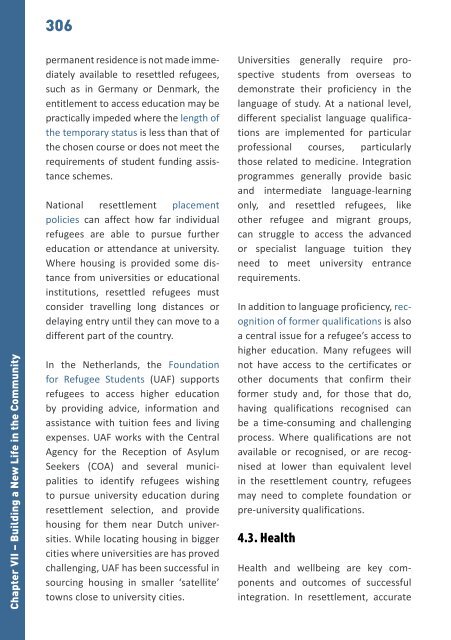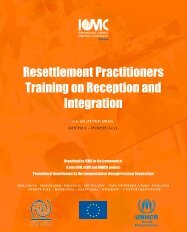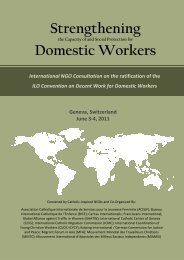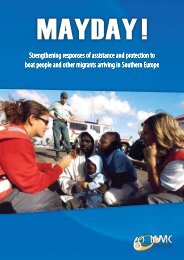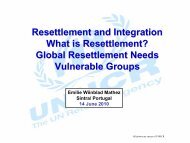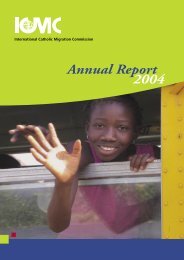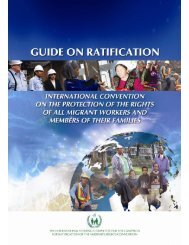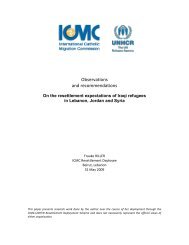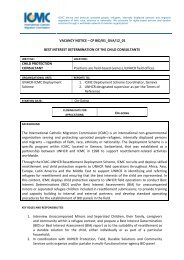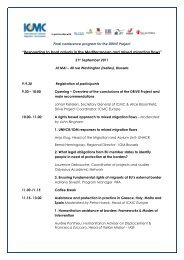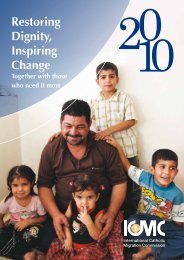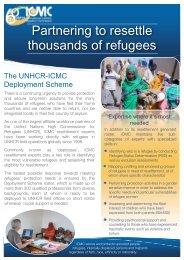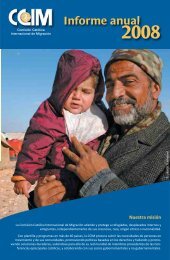ICMCEUROPE WelcometoEurope.pdf (5.89 MB)
ICMCEUROPE WelcometoEurope.pdf (5.89 MB)
ICMCEUROPE WelcometoEurope.pdf (5.89 MB)
You also want an ePaper? Increase the reach of your titles
YUMPU automatically turns print PDFs into web optimized ePapers that Google loves.
306<br />
Chapter VII – Building a New Life in the Community<br />
permanent residence is not made immediately<br />
available to resettled refugees,<br />
such as in Germany or Denmark, the<br />
entitlement to access education may be<br />
practically impeded where the length of<br />
the temporary status is less than that of<br />
the chosen course or does not meet the<br />
requirements of student funding assistance<br />
schemes.<br />
National resettlement placement<br />
policies can affect how far individual<br />
refugees are able to pursue further<br />
education or attendance at university.<br />
Where housing is provided some distance<br />
from universities or educational<br />
institutions, resettled refugees must<br />
consider travelling long distances or<br />
delaying entry until they can move to a<br />
different part of the country.<br />
In the Netherlands, the Foundation<br />
for Refugee Students (UAF) supports<br />
refugees to access higher education<br />
by providing advice, information and<br />
assistance with tuition fees and living<br />
expenses. UAF works with the Central<br />
Agency for the Reception of Asylum<br />
Seekers (COA) and several municipalities<br />
to identify refugees wishing<br />
to pursue university education during<br />
resettlement selection, and provide<br />
housing for them near Dutch universities.<br />
While locating housing in bigger<br />
cities where universities are has proved<br />
challenging, UAF has been successful in<br />
sourcing housing in smaller ‘satellite’<br />
towns close to university cities.<br />
Universities generally require prospective<br />
students from overseas to<br />
demonstrate their proficiency in the<br />
language of study. At a national level,<br />
different specialist language qualifications<br />
are implemented for particular<br />
professional courses, particularly<br />
those related to medicine. Integration<br />
programmes generally provide basic<br />
and intermediate language-learning<br />
only, and resettled refugees, like<br />
other refugee and migrant groups,<br />
can struggle to access the advanced<br />
or specialist language tuition they<br />
need to meet university entrance<br />
requirements.<br />
In addition to language proficiency, recognition<br />
of former qualifications is also<br />
a central issue for a refugee’s access to<br />
higher education. Many refugees will<br />
not have access to the certificates or<br />
other documents that confirm their<br />
former study and, for those that do,<br />
having qualifications recognised can<br />
be a time-consuming and challenging<br />
process. Where qualifications are not<br />
available or recognised, or are recognised<br />
at lower than equivalent level<br />
in the resettlement country, refugees<br />
may need to complete foundation or<br />
pre-university qualifications.<br />
4.3. Health<br />
Health and wellbeing are key components<br />
and outcomes of successful<br />
integration. In resettlement, accurate


